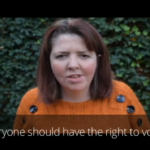On this page, you can read about the proposed Work-Life Balance Directive.
You can find out more about:
What is the Work-Life Balance Directive?
“We need to treat people as people and not only as a workforce”
– Marian Harkin, MEP
The Work-Life Balance Directive is a proposed EU law which aims to make it easier for people working in the EU to balance paid work and private life, including caring responsibilities. It has the potential to improve the situations of family members of people with intellectual disabilities, and people with intellectual disabilities themselves, to better combine their work with their parental and/or caring responsibilities. When adopted, the Work-Life Balance Directive would introduce, amongst other things, minimum standards for parental leave including paternity leave, carer’s leave, the right to flexible working arrangements for parents and carers, and safeguards against unfair dismissals.

Who would benefit from the directive?
Little official data is available on the number of carers, especially of carers of people with disabilities. Eurocarersreports that in Europe it is mostly informal carers, such as family members, who look after their relatives or other persons close to them. The latest European Quality of Life Survey showed that 15% of working men and 19% of working women are caring for a relative or friend with a disability or impairment. These are high numbers, which means that a lot of people with caring responsibilities in the EU would benefit from the directive.

Percentage of the working population caring for relatives or friends with a disability or an impairment, by age. Source: European Quality of Life Survey
The survey highlighted existing inequalities in caring responsibilities and access to work between men and women. A higher percentage of women than men care for a person with a disability or impairment (15% of women compared to 9% of men). Amongst those with caring responsibilities, 73% of men, but only 58% of women also go to work.
The possibility to request flexible working arrangements and carer’s leave, therefore, would help foster the participation of both men and women with caring responsibilities in the labour market and allow for a better share of caring responsibilities between men and women.
How would the directive improve the situation of people with intellectual disabilities and their families?

The directive would help employees with caring responsibilities to better combine these with their work. It would do so in two ways:
- By creating minimum standards for carer’s leave
- By providing flexible working arrangements for carers and parents
Carer’s leave
According to the current proposal, the leave will be granted to children, parents or spouses/partners of people in need of care or support.
The exact number of days of carer’s leave per year and the remuneration for employees taking it are still subject to negotiations between the European institutions.
The European Union currently has no minimum standards for carer’s leave.
Flexible working arrangements
According to the proposal of the European Commission, all working parents of children up to 12 years old, as well as workers with relatives in need of care or support will have the right to request the following working arrangements:
- Reduced working hours
- Flexible working hours
- Flexibility on the place of work
The maximum age of children mentioned beforehand is still subject to negotiations and might be lowered.
Currently, European Union law recognises the right of all workers to request part-time work. European Union law also allows parents returning form parental leave to apply for reduced and flexible working hours.
Inclusion Europe’s position:
Carer’s leave
It is difficult for family carers to find work that allows them to meet their caring obligations. Family carers are often in unstable employment, or not employed at all. This can lead to financial precarity, which puts further strain on the family.

We want family carers to be able to find a job and stay in it more easily. A more inclusive and flexible labour market is the cornerstone to make this happen.
Inclusion Europe therefore welcomes the provision of carer’s leave as foreseen in the directive.
Carers should not only be entitled to take leave, but also receive adequate compensation. Caring for family members must not lead to financial insecurity. It is therefore very important that the final text of the directive foresees an adequate level of remuneration for those taking carer’s leave.
Flexible working arrangements

The directive would introduce the right for carers to request flexible working arrangements (flexible hours and location) and the right to request to return to the original working pattern afterwards.
We welcome this as an important improvement compared to the current situation in many European countries.
The directive also foresees that family carers and parents with disabilities are more protected against unfair dismissal for requesting either flexible working arrangements or carer’s leave. Following a period of absence, they would also get the right to return to their previous or an equivalent position.
We think these are important provisions that will protect family carers and parents with disabilities, and make sure that they will actually be able to take advantage of these opportunities.
Equality between men and women
The possibility for both men and women to take carer’s leave and request flexible working arrangements will create opportunities for parents to share caring responsibilities more equally. We think this is a step in the right direction for more gender equality.

Has the Work-Life Balance Directive been adopted?
Currently, the directive is still a proposal and is subject to discussions between the different European institutions. This means that the details of the directive and its content are still being negotiated.
The European Commission made a proposal for a Work-Life Balance Directive in April 2017. The European Parliament and the Council of the European Union (comprised of the ministers of all EU member states) must now review the proposal, and both must agree on a common final text for the directive to be adopted and to become law.
To facilitate the adoption of the law, each of the two institutions adopted a position on the text. The positions present changes, or amendments, to the European Commission’s proposal. While the Council of the European Union adopted its position on 21 June 2018, the European Parliament followed on 11 July 2018.
In September, they entered into interinstitutional – also called trilogue – negotiations, with the European Commission as facilitator/mediator. These negotiations help the institutions find a compromise so that both agree on a common final text. There is always a possibility that no common agreement is reached and that the proposal is abandoned and never becomes law, as it happened with the proposed Maternity Leave Directive in 2015.
All steps of the legislative process towards the adoption of the Work-Life Balance Directive can be followed on the website of the Legislative Observatory.
What other measures will be taken by the European Union to support a better work life balance?
In her message for Inclusion Europe’s 30th anniversary, Commissioner Marianne Thyssen spoke about the European Pillar of Social Rights
Improving the work-life balance of employees with caring responsibilities is one of the 20 principles of the European Pillar of Social Rights. The Work-Life Balance Directive is one of the EU’s tools to achieve this. Other actions will be taken in parallel by the European Union to support member states in providing a better work-life balance, for example:
- ensuring protection against discrimination and dismissal for parents (including pregnant women and workers coming back from a leave) and carers;
- encouraging a gender-balanced use of family-related leaves and flexible working arrangements;
- making better use of European funds to improve long-term and childcare services;
- removing economic disincentives for second earners which prevent women from accessing the labour market or working full-time.
How does Inclusion Europe support the Work-Life Balance Directive?
Inclusion Europe has joined COFACE Families Europe in their campaign called #IwantWorkLifeBalance, which urges decisionmakers to support a strong Work-Life-Balance Directive.
In the context of this campaign, several actions were taken.An Open Letter to the Council of the European Union was sent prior to the Council’s meeting on 21 June to demand it adopts a position on the proposal for the directive. This was accompanied by a campaign on social media (still ongoing) using the hashtag #IwantWorkLifeBalance. It is important to ensure that the proposal remains on the agenda of the Council of the European Union and of the European Parliament so it is not forgotten.

What can I do to support a strong Work-Life Balance Directive?
You can be active in supporting the adoption of a strong work-life balance!
If you want to read more about EU policy making and how to participate in it, have a look at this useful guide from Mental Health Europe.
As the European Parliament and the Council of the European Union legislate jointly on new EU law, it is important to reach out to both your national Members of the European Parliament (MEPs) and the responsible national ministers and heads of states. You can find which MEPs sit in the Employment and Social Affairs Committee on the European Parliament’s website. Look at the MEPs’ opinions to see which changes they wish to make.
One important point in the directive, which is still under discussion, is the question of payment for carer’s leave: While the majority of MEPs wants the directive to state carer’s leave should be paid to at least 78% of the gross salary of the persons taking it, the Council of the European Union wants to completely remove any reference to payment.

Source: Video by Mental Health Europe
Ask both your national MEPs and ministers to support a strong Work-Life Balance Directive: Tell them why the directive is important for many families and remind them of the things that are essential for carers. In this way, you can help making sure that the European Commission’s proposal for the directive will not be watered down.
An example of an initiative led by an organisation would be that of Unapei, our French member. Together with 50 other organisations, Unapei sent an Open Letter to French President Emmanuel Macron ahead of his speech at the European Parliament in April 2018. French support for the directive was at the time uncertain, and in the voting system of the Council of the European Union, a text is adopted only if more than half of the EU member states vote in its favour. It is therefore important to gain French support for the proposal.
Where can I find more information?
- Have a look at the resources from the European Commission.
- Read the EU Parliamentary Research Service’s briefing and listen to its podcast to find out more about the directive.
- Visit the page of COFACE Families Europe dedicated to their campaign for a strong Work-Life Balance Directive. Read the analysis of the opinion of the Council of the European Union on the directive.
- “Employment” will be our focus in 2021. Find out more about our strategy for the coming years:






